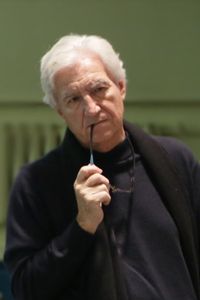|

Yannis Kokkos (biography)
Premiere of Jules Massenet’s
operaDon Quichotte
28, 29 December 2012
and 9 January 2013 | |
What plot lines in Massenet’s opera Don Quichotte are important for you, in terms of form and ideas?
Don Quichotte is a wonderful and also a very particular opera. Massenet was a musician of great musical culture and he plays, in a subtle way, with references and “pastiches”. He wrote this opera at the end of his life, obsessed by the imminence of death, present in his work with an “elegance of despair” masked under a musical brio...
It is important to make the atmosphere visible. For example, the crowd which I deliberately set in a carnival scene, a fair, at the beginning of the first act changes into an aggressive ensemble at the end of the fourth act when this society definitively rejects Don Quichotte.
It is important to make felt the contrast between a materialistic society only occupied by immediate pleasure and the character of Don Quichotte, this “heavenly fool” who wants to chase his dream of an ideal world based on kindness and imagination... This clash also adds to the comic nature of the situation which is part of the opera... It is a dream-like ambience which is sometimes more realistic and sometimes more extravagant and so on... We are in a kind of “Spanish dream” of around 1900. Choosing this period makes the contrast clearer between a “bourgeois” society and the popular iconic figure of Don Quichotte, dressed in his fantasy armour with the faithful Sancho at his side.
So Don Quichotte and Sancho are in contrast to the opera’s other characters. Do you accent this antagonism in your production?
Yes, they are icons, but with real humanity. Except for Dulcinée the other characters are more sketched figures. Dulcinée in the world of Cervantes is virtual. She exists only in Don Quichotte’s imagination, which transfigures simple peasant girls into his feminine ideal.
In Massenet’s opera Dulcinée is very real. A woman of liberated attitude and being. She is more like a French “coquette” at the time of Massenet than a Carmen. Her lightness “kills” Don Quichotte in a way. She is cruel and sensitive at the same time. In the end she chooses to remain embedded in a materialistic society rather than accept the other side of herself as represented by Don Quichotte – the beauty of innocence. On the other hand, Sancho Pança is in the opposition of Don Quichotte, he struggles with the real world and knows how to manage misfortune. Little by little the dream of Don Quichotte becomes his dream and their two characters become not only complimentary but equal.
When I read the novel in the complete version I realised that the opera and the novel were two different approaches to the subject. The novel is one of the greatest achievements in literature, with a multiplicity of points of view, complexity of sense, never moralistic and always freethinking. The opera is more a “comédie héroïque”, a real French “opéra comique” on which the great shadow of the novel is projected with musical pages of deep humanity and melancholy...
Speaking with Nadezhda Koulygina
The full interview may be found in the booklet for the premiere. |
